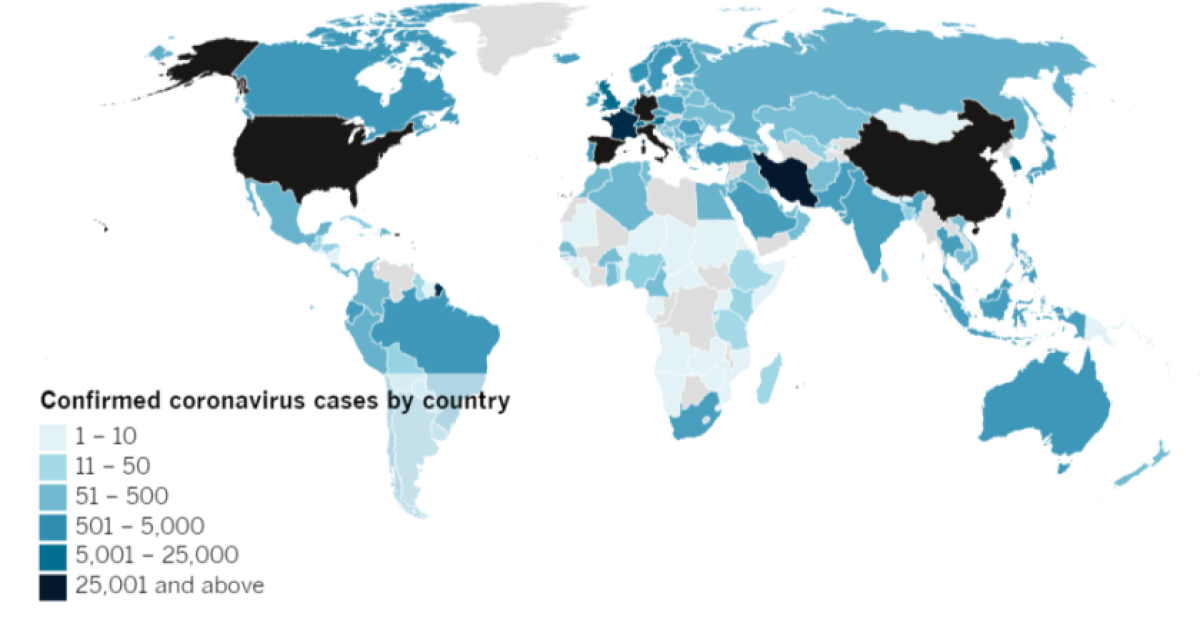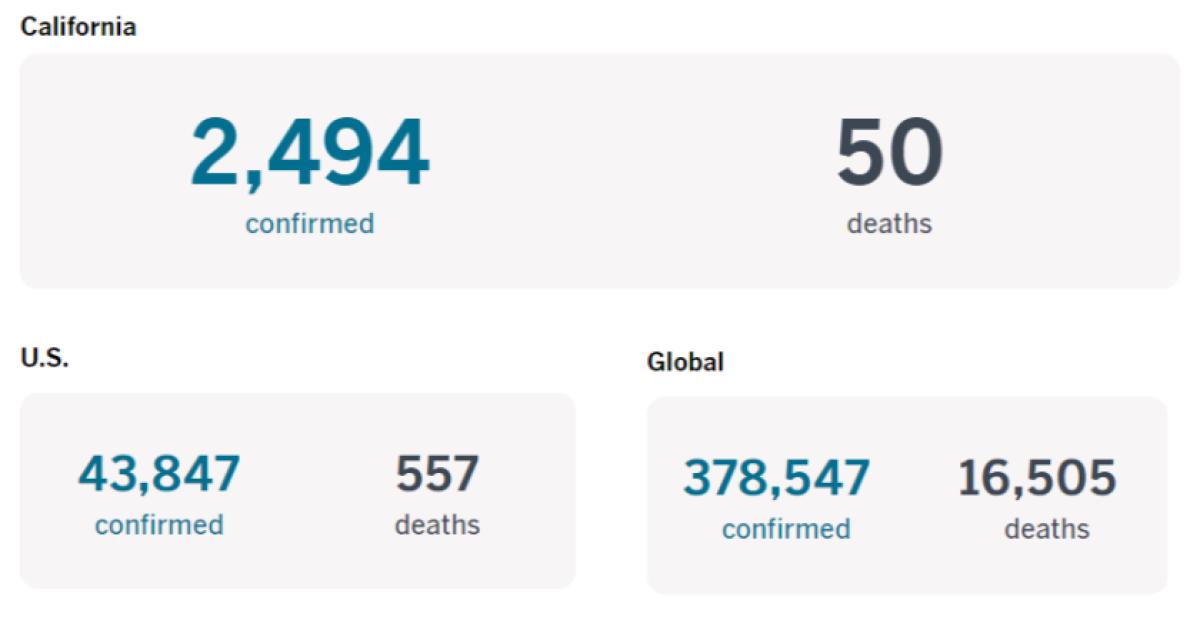Coronavirus Today: Private data versus public health
Good evening. I’m Diya Chacko, and it’s Tuesday, March 24. Here’s what’s happening with the coronavirus outbreak in California and beyond.
A steep rise in the number of people being hospitalized with COVID-19 in Los Angeles County is probably a sign that a wave of extremely sick patients could overwhelm hospitals in the coming weeks. Medical providers say they’re rushing to draft policies to handle the tough decisions they anticipate they’ll have to make.
A second crisis is brewing in doctors’ offices nationwide: Primary care physicians are seeing a steep drop-off in visits as patients stay away to reduce their risk of getting ill. Growing numbers of practices are considering laying off staff or even closing their doors. And that’s stoked alarm that even more patients will end up in hospitals at a time when every bed is needed.
California has fallen behind New York and other hot-spot states in testing and tracking cases as an assortment of public and private groups pursue testing programs in an uncoordinated fashion. Public health experts warn that robust, coordinated testing is crucial so the state knows not only who is infected but where and how quickly the virus is spreading. Only then can they deploy medical staff and equipment most effectively.
One of the best ways to limit the spread of a pandemic is immediately to locate, test and isolate anyone who’s had contact with a carrier, and there’s a growing sentiment worldwide that technology can play a vital role. Singapore introduced an app to alert users if they’ve been near someone who has a confirmed case of COVID-19, and countries including China, South Korea and Israel are tracking citizens’ cellphones to warn them of potential infections and chart the path of the disease.
But the growing surveillance is stoking tensions and raising questions over how to balance public health and personal privacy. “In many cases, the fear and panic has allowed governments to impose quite drastic measures which can be very difficult to roll back,” one Human Rights Watch researcher said.
In the U.S., the response to the pandemic has ignited debate over a very different trade-off — people’s lives or the economy. President Trump and some of the nation’s most prominent governors plunged into heated debate Tuesday over how many deaths they’re willing to risk in order to get the economy running again. Trump’s remarks during a Fox News appearance that he wanted the country “opened up and just raring to go by Easter” drew sharp rejoinders and resistance from governors in both parties.
Still, the White House and Senate Democrats were close to a deal for a nearly $2-trillion economic stimulus package including direct payments to most Americans and a half-trillion-dollar fund to shore up struggling companies. That progress cheered Wall Street, giving the Dow its best day since the Great Depression.
Meanwhile the pandemic has prompted the International Olympic Committee to postpone the 2020 Summer Games in Tokyo until next year. No specific date has been set. It’s only the fourth time since the first modern Olympics were held in 1896 that the Games have been so drastically affected by world events, and all of those other three times were cancellations during the first and second World Wars.
By the numbers
Cases as of 4 p.m. PDT Tuesday:
Track the latest numbers and how they break down by county and by state with our graphics.
Where is the coronavirus spreading?

Your support helps us deliver the news that matters most.
Across California
The outbreak is forcing many people to choose between their health and a paycheck, in particular workers Trump declared essential, such as fast-food employees. Cooks and cashiers at two McDonald’s restaurants in San Jose and Los Angeles went on strike last week after hours were cut and demands for health and safety protections, like supplying gloves and sanitizers, allegedly went ignored.
Community clinics that typically handle primary care have been canceling their regular appointments and seeing more patients with possible COVID-19 symptoms. They’ve helped mitigate the spread of the virus and prevented sick patients from overwhelming hospitals. But clinic leaders say they’re worried about not being able to provide the necessary primary care, and that they too are running low on the equipment they need to protect staff.
L.A. County Sheriff Alex Villanueva on Tuesday said gun shops are nonessential businesses, and if they don’t close their doors, they will be cited and face the loss of their business licenses. Gun sales are surging in many U.S. states; in California, crowded gun stores have drawn lines of customers who aren’t adhering to social-distancing measures.
How to stay safe
— Wash your hands for at least 20 seconds! Here’s a super-fun how-to video.
— Stop touching your face, and keep your phone clean.
— Watch for these symptoms of possible infection: fever, cough, shortness of breath.
— If you’re worried you might be infected, call your doctor or urgent care clinic before going.
— Be sure to practice social distancing, such as maintaining a 6-foot radius of personal space in public.
— Only wear a mask if circumstances warrant it, for instance if you must be in very close contact with people in a public area.
How to stay sane
— Here are all the ways to stay virtually connected with your friends.
— Need groceries? Here’s how to stock up for staying home. You can also watch our video guide on YouTube.
— Visit our free games and puzzles page for daily crosswords, card games, arcade games and more.
— The restaurant industry has been devastated. If you’re having a tough time, here are some free resources that may help.
— Advice for helping kids navigate pandemic life includes being honest about uncertainties, acknowledging their feelings and sticking to a routine. Here’s guidance from the CDC.
Around the nation and the world
Indian Prime Minister Narendra Modi announced a nationwide lockdown on Tuesday, ordering 1.3 billion people to stay in their homes for three weeks in the world’s biggest curfew. The lockdown went into effect at midnight, shutting down flights, trains, schools, houses of worship and nearly all businesses across the country.
While domestic infections had dropped in Taiwan, Hong Kong and mainland China, a new wave of imported cases is raising tensions between locals and expats, especially those from Western countries where many citizens are perceived as not taking the pandemic seriously. Hong Kong has seen more infections in a week than it has in months, most of them coming from abroad.
The virus has shaken Las Vegas’ economy in an unprecedented way, ushering in a new reality for thousands of locals who only recently emerged from the 2008 recession. When asked to compare the two events, one show girl said: “This is a little scarier. Before, yes, it impacted our industry, but it didn’t shut our city down.”
Your questions answered
Today’s reader question comes from Douglas Craft, who wants to know: What precautions are necessary when retrieving packages and newspapers?
The World Health Organization has said it is safe to receive packages, including in areas affected by the pandemic. To be extra safe, you can also take steps like wiping down packages with a disinfectant and washing your hands after opening them.
Here at The Times, our production process is fully automated, which minimizes human contact with the newspapers. In addition, The Times has asked its distributors to take the recommended precautions during this period, including requiring newspaper carriers to practice social distancing and personal hygiene, or stay home if they are sick.
We are also encouraging our print subscribers to activate their unlimited access to our website, eNewspaper and app. This will help ensure they have access to the most current information and reporting on the coronavirus outbreak. If you aren’t already a Times subscriber, consider becoming one.
Got a question? Our reporters covering the coronavirus outbreak want to hear from you. Email us your questions, and we’ll do our best to answer them. You can find answers to other common questions in our morning and midday roundup.
For the most up-to-date coronavirus coverage from The Times, visit our live updates page, visit our Health section and follow us on Twitter and on Instagram.





